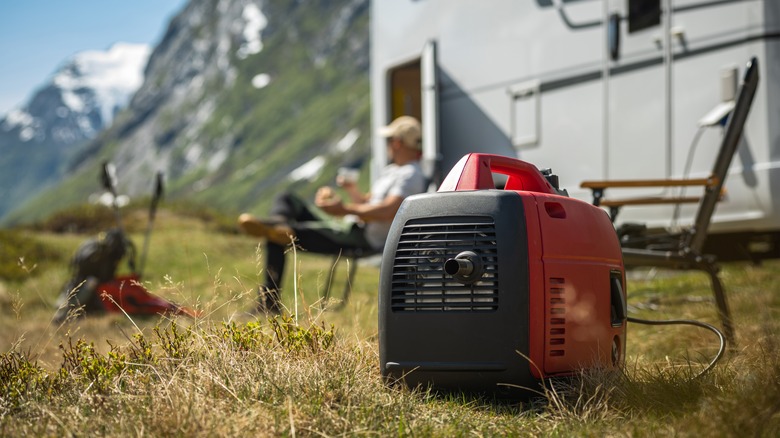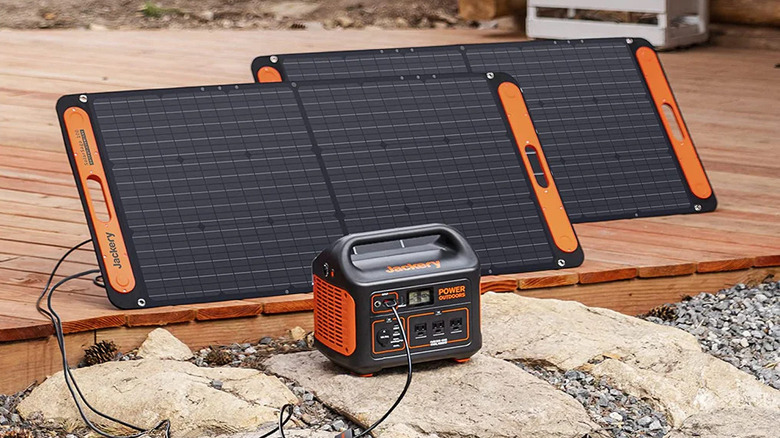Solar Panels Vs. Generator: Which Is The Better Option While Camping
When some people go camping, they like to do things the old-fashioned way, where it is just them and the elements. For others, modern technology has made the prospect of camping much less of a true rough-and-tumble experience than it used to be. Most notably, you have the ability to utilize modern conveniences out at the campsite, whether that be your smartphone, a heated sleeping bag, or a portable grill for cooking. Having these things out in the wilderness is wonderful, but you have to make sure that they are all ready to use. This is where having one of the most popular portable generators comes into play.
We have had generators in the world for some time now to power various things you may have on your campsite, but they have had one major drawback. They run on harmful fossil fuels, and we should all be mindful about what we are emitting into the atmosphere. More recently, we have seen a new kind of generator hit the market. Instead of using gasoline, diesel, or propane — depending on the model — these new generators utilize solar panels to bank their energy. The question becomes whether or not these new solar panel-powered generators are worthy replacements for the classic generator.
The case for solar panels
The obvious advantage solar panel-powered generators have over traditional ones is their lack of environmental impact. By harnessing power from the sun, there is no risk of emitting hazardous pollutants into the air like carbon monoxide. There are gas-powered generators that meet EPA standards, but that doesn't stop the fact that fuel consumption and emissions are occurring. If the environment is your top priority, then getting a solar-powered generator is a no-brainer.
However, these generators are not without their drawbacks. Unlike a gas-powered generator that you just have to refuel for it to run, using an electric generator like this requires time to charge. For example, the Jackery Solar Generator 3000 Pro takes nearly two and a half hours to fully charge up if plugged into an outlet. If you are using solar panels, it could be several hours longer depending on how many solar panels you have and what wattage they are. With four 200 W panels — a package that costs an immense $4,799 — it would take five hours to fully charge the generator. Plus, you have to carry all of these panels with you on your trip.
If you are using solar panels to power your generator on your camping trip, you need to be able to have ample time where using electricity isn't a priority which gives it time to recharge. It turns out that helping the environment takes time.
The case for generators
The big benefit of the traditional, gas-powered generator is its ease of use. To run things, you simply have to add fuel to your generator and start the motor, typically by pulling a crank like you would a lawnmower. Because this technology is much older, these generators will also cost you less money upfront. Take the Honda EU3000iS, which has the same wattage as the previously mentioned Jockery solar generator. That costs $2,799, a full $2,000 less than the Jackery. However, you need to take two things into account with those prices. The first is that the Jockery comes with four solar panels, which will cover your fueling for the rest of that generator's life. Meanwhile, the traditional generator will need you to constantly purchase fuel as the years go on, and if you go camping a lot, those costs could outpace the solar over time.
Traditional generators come with a ton of baggage as well. First, there are the obvious environmental downsides that we've mentioned. Beyond that, these generators tend to weigh a good deal more than solar generators. To use these two generators as an example again, the Jackery weighs 63.93 pounds, whereas the Honda comes in at 130.7 pounds, and that's before you add fuel. Figuring out how to lug that around in the woods could be trouble, along with carrying your canisters of gasoline for refueling.
Gas-powered generators also tend to be loud. Even quiet generators are rated between 50-60db, equivalent to ambient noise in a busy restaurant.
Choosing between a gas-powered or solar-powered generator comes down to convenience, price, practicality, and the environment. Whichever of these you prioritize the most will determine which one you choose when you head out to a campsite.


